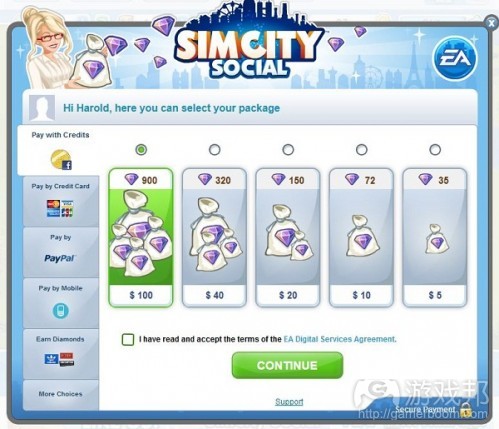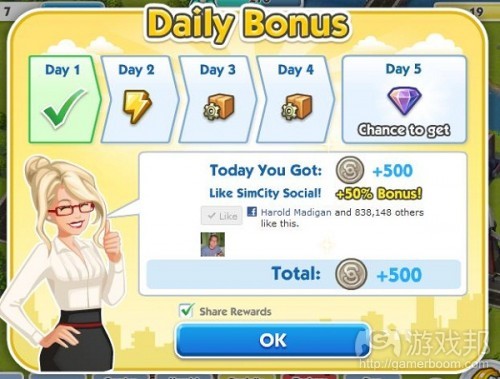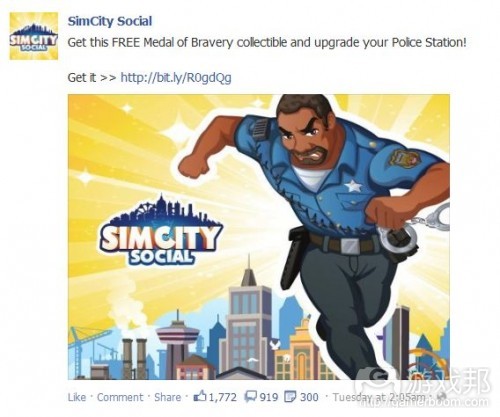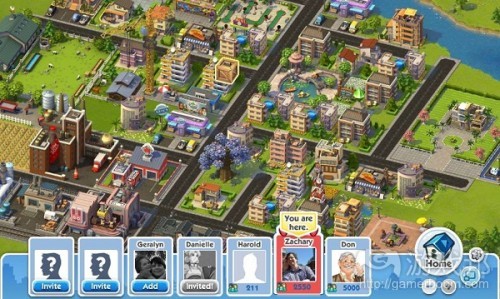盘点《SimCity Social》七宗“罪”及其心理技巧
作者:Jamie Madigan
我最近听到不少关于《SimCity Social》的消息,这款Playfish和EA开发的游戏被称作“披着SimCity外衣的Farmville”。我听到的多半是关于游戏如何使用各种诡计诱骗玩家互发邮件、交换道具、招揽新玩家以及金钱买卖等。这些东西是社交游戏的惯用招术,但在这里我们显然看到了更骇人听闻的情况。所以,我决定探究一番,看看《SimCity Social》到底怎么施展它的心理学技巧。
第一宗罪:互惠
所谓的“互惠”就是“礼尚往来”,这是人类社会的基本原则和普遍心理。在超市,一旦你拿了免费样品,即使你不能当场买下,至少也得听听漂亮的服务员对新品牌饼干的热情描述。著名的心理学家Robert Cialdini于2001年在《科学美国人》杂志发文阐释,美国退伍军人组织(Disabled American Veterans organization)在他们的邮件募款中利用互惠手段,仅仅通过赠送免费的地址贴纸而将筹款成功率从18%提高到35%。
《SimCity Social》将“交换礼物”与游戏中几乎各方面相结合。比如,每天赠送一次礼物给其他玩家。如果你缺少某种材料,假设你的研究室需要一名科学家,你可以请求朋友赠送一个给你。你每得到一份礼物的,就会同时得到一些点数。在游戏中,回赠朋友很容易,并且每一次交换礼物,系统就会给你发一份Facebook通告,提示你去打开游戏。非游戏玩家首次安装该游戏也可以收到礼物。
第二宗罪:隐性货币
与大多数游戏一样,《SimCity Social》允许玩家消费真钱来加速游戏和开放资源权限。比如,你建造玩具工厂需要更多“惊喜”,我不知道这个“惊喜”是什么东西,但你可以用信用卡买!当然,你不可以直接用信用卡支付。你必须先购买一些游戏虚拟货币,也就是紫色的钻石,然后用紫钻支付。
就好比游客在国外用外国货币支付,使用紫钻更容易让玩家在思考时产生偏差和错误,因为他们懒得先在脑内换算货币,或对紫钻运用不同的(和无理的)脑力计算支付价值,或者因为不想“浪费”而过度消费不用的紫钻。
第三宗罪:默认效应
还是说紫钻。当你点击购买紫钻,你可以看到六种不同的面额,从价值100美元的900钻到售价5美元的35钻。注意,上图中的默认选项居然是最贵的那一个。
这个设计利用了所谓的“默认效应”,也就是,我们往往会接受默认设置、决定或选项,而不是自找麻烦去作调整。这种现象在模糊的或认知上有高要求的情况下尤其常见。Madrian和Shea于2001做过一项研究,发现要求员工选择退出而不是选择加入储蓄计划(游戏邦注:也就是如果员工不主动选择退出,就默认他们同意加入计划),可以大量提高加入计划的员工人数。
类似地,更多玩家会默认购买100美元900个的紫钻。当然,许多人可能会认为这在大多数情况下是少见的,因为大多数人只肯花几块钱,而不是一出手就100块。这大概没错,但《SimCity Social》在其他地方也利用了“默认效应”。当你需要确认通过Facebook发送请求给另一名玩家时,系统就会自动确认对话框“发送请求给XXX,不再提醒”。当你在游戏中完成了某任务,系统通常会发送一个通告到你的Facebook涂鸦墙,除非你不勾选该对话框中的“分享成就”,否则当你点击“OK”后,“分享成就”是自动生效的。如上图所示,该选项是默认的。
第四宗罪:稀缺效应
有时候,我们现在想要某些东西只是因为我们可能之后就没办法得到了。这种心理就是“稀缺效应”。心理学家Stephen Worchel于1975年曾做过一个简单的实验,有两个瓶子中的其中一个拿了一块巧克力饼干给受测者,一个瓶中的巧克力饼干有很多,而另一个的很少。事实上,两个瓶子中装的是相同的饼干,但受测者们认为饼干较少的那一瓶更贵更好吃。只是因为那个瓶中的饼干更少,我们的大脑是就不愿意错过能得到更少饼干的选择。
从限时供应中,我们看到了同样的现象。如果某物限时销售一天,为了不错过,我们更可能花大价钱购买,而不是在它平时以低价出售时购买。每次玩家升级,《SimCity Social》就提供大折扣的新建筑,以此创造这种“稀缺效应”。但玩家必须在退出“升级!”通告——告诉玩家“机不可失,失不再来”的对话框之前就采取购买行动。
第五宗罪:赠送进度
我们一旦踏上争取某个目标的征程,就不太愿意半途而废了。这个强大的企图可以激励我们达到目标,但也可能适得其反。另外,我们非常容易受到“我们已经开始了,甚至马上就完成了”这样的暗示的影响。
我可以举一个我最喜欢的例子来解释“赠送进度效应”。Xavier Dreze 和 Joseph Nunes于2006年做了一项研究,他们的给半数的顾客一张某洗车处的洗车卡,8个图章换一次免费洗车;而另一半的顾客给的是类似的洗车卡,需要10个图章,但一开始就给了2个免费的图章。所以,两组顾客都只需再得8个图章,但一开始就得到2个免费图章的人更可能再次光顾该洗车处。
《SimCity Social》也在不同地方利用了“赠送进度效应”。比如,升级建筑需要各种材料,但玩家通常一开始就会有其中几种。也就是,玩家查看升级进度时,可以看到类似“2/20安全帽”这样的东西(游戏邦注:其中2个安全帽是游戏赠送的)。各个游戏模块也有多个特定的目标要达成(如,“建造一个面包厂”),在一片混乱中,我发现自己经常已经完成这些目标中的一个。
第六宗罪:易获得性偏误(availability heuristic)
“易获得性偏误”是指,人们倾向于根据一个事例在记忆中的可得性来评估其出现频率,容易回想起的被判定为更常出现。也就是,最易被想到的事情通常会被认为是最普遍的、最经常发生的事情。(有趣的是,反过来说也成立:如果我们很难记住某事例,我们就会低估它发生的频率。)
许多东西可以帮助某事件更容易被回忆起来,比如看到它发生在朋友事上。《SimCity Social》玩转这个花招的方法是,鼓励玩家在自己的Facebook上发布自己在游戏中参与活动的通告,而事实上你才刚开始玩这款游戏。当看到通告的朋友会更容易想起那款游戏,当他们看到游戏的广告或接到游戏邀请时,也就更可能高估了游戏的流行程度。
第七宗罪:良性嫉妒和恶性嫉妒
社交攀比,毫不意外,是社交游戏中的重要内容。嫉妒可以分为两类,“良性嫉妒”和“恶性嫉妒”。前者产生时,我们诊断某人理应得到某物,因为那是他们自己争取到的;而后者出现时,我们恨不得从别人手中抢过那光鲜的东西。良性嫉妒激励我们自我提高(或花钱)以争取相同的成就。Van de Ven和Zeelenberg于2011年做了一个研究,当受测者的朋友得到新iPhone,受测者表示自己愿意多花64%的钱来购买自己的iPhone,此时受测者产生了良性嫉妒。
《SimCity Social》利用良性嫉妒的方法是,让你参观其他玩家的小镇,你可以看到别人建造或购买的任何东西。有趣的是(也许是游戏中最有趣的),当你点击他们的物品时,你可以选择做出表示友好或恶意的行为。你可以在他们的的商店里“打翻展示台”,或者在参观他们的市长的家时“赞美装饰”。你甚至可以在他们的天空中放出一束喜庆的热气球或者一群捣乱的海鸥。当然,如果你对他们的成就和设计产生良性嫉妒,你可能受刺激去邀请更多朋友或购买更多紫钻跟他们攀比。
上文就是我所揭露的《SimCity Social》的“伎俩”。我没说Playfish在给玩家洗脑——这些只是很老套的设计原则,并且设计电子游戏的人往往很机灵,所以他们会想出并且记住什么招术会管用。这些都不是《SimCity Social》的专利,大部分社交游戏都或多或少地运用了这些手段。但是,如果你决定从事一点Facebook游戏开发工作,请记住以上七点。(本文为游戏邦/gamerboom.com编译,拒绝任何不保留版权的转载,如需转载请联系:游戏邦)
Seven Psychological Sins of SimCity Social
by Jamie Madigan
I’ve recently been hearing a lot about SimCity Social, the “Farmville with a candy coating of SimCity” game from Bigfish and EA. Mostly I’ve heard about how the game pulls all kinds of tricks to get players to spam each other, trade items, recruit new players, and spend real money. All of these things are par for the social game course, but apparently we have a more egregious than usual offender here. So I decided to investigate what psychological tricks SimCity Social pulls by forking over all kinds of pervasive permissions to my Facebook account and trying it out.
Wow. There’s so much going on here that within a few seconds I blacked out and woke up some time later in a puddle. I don’t know how this happened.
What I do know, though, is that SimCity Social wears many of its machinations on its custom tailored sleeve. I counted seven pretty much immediately and decided to stop there, because I love alliteration and had this great idea for a blog post title. The convenient thing is that these are all things I’ve written about before, so instead of going into depth on each I’ll give you the gist and then point you at other articles if you want more.
Sin #1: Reciprocity
Reciprocity is the impulse we feel to return favors, and it’s a pretty fundamental factor in human society and psychology in general. Whenever you get a free sample at the supermarket, the nice lady in the hairnet is banking on reciprocity to at least listen to her enthusiastic description of this new snack cracker if not buy a box right then and there. Famed psychologist Robert Cialdini explained in a 2001 article in Scientific American how the Disabled American Veterans organization used reciprocity to increase the success rate of their mail-based fundraisers from 18% to 35% simply by free return address stickers as a tiny gift with each appeal.
SimCity Social has gift trading baked into almost every aspect of the game. You can, once a day, gift other players with a few resources. If you’re low on specific resources –say a scientist to staff your research lab– you can request them as gifts. And you get points for every gift you accept. The game makes it easy for you to return the favor, and each exchange sends you a Facebook notification that prompts you to launch the game and keep playing. Non-players can receive gifts too, provided they first install the game and start playing themselves.
Read more about reciprocity:
How Reciprocity Yields Bumper Crops in Farmville.
Sin #2: Funny Money
Like most “wait to play” games, SimCity Social lets you spend real money to accelerate the game and get past the time and resource restrictions. Need more “bliss” to finish construction of your toy factory? I don’t know what “bliss” is, but you can get out your credit card and buy some! But, of course, you can’t just charge stuff straight to your card. You have to buy some of the game’s currency, little purple diamonds, and then spend those.
The problem is that like travelers spending money in a foreign currency, spending purple diamonds makes you susceptible to several biases and errors in thinking, ranging from being too lazy to do the mental currency conversions, to applying different (and irrational) mental accounting to diamonds than you would real money, to overspending unused diamonds because you don’t want to “waste” them.
Read more about funny money:
The Psychology of Microsoft Points Part 1: Waste Aversion
The Psychology of Microsoft Points Part 2: Conversion Factors
The Psychology of Sony’s Playstation Move Announcement
Sin #3: The Status Quo Effect
Let’s stick with the little purple diamonds for a minute. When you click to buy some, you’re presented with six different denominations you can buy, ranging from 900 diamonds for $100 to 35 diamonds for $5. Notice in the screenshot which of those options is selected by default, though: the most expensive one.
This is designed to take advantage what’s called the status quo effect, which describes our tendency to accept default settings, decisions, or options rather than make the often trivial effort to change them. This is especially true in ambiguous or cognitively demanding situations. For example, in one study (Madrian and Shea, 2001), researchers were able to drastically increase the number of employees who participated in a savings plan just by requiring them to opt out of the program rather than opt in.
Similarly, more people shopping for diamonds should go with the default choice of 900 for $100. Of course, many of you may be thinking that this is too extreme to work in most cases; most people are looking to spend just a few bucks, not $100. And you’re probably right, but SimCity Social uses the status quo effect elsewhere as well. Whenever you have to confirm sending a request to another player via Facebook, the system automatically checks a box that says “Don’t ask again before sending requests to [NAME] from this app.” When you accomplish something in the game, it often throws up a notification that includes the ability to “Share Rewards” to your Facebook wall after you click “OK.” This is, of course, selected by default as shown in the screenshot above.
Read more about the status quo effect:
The Status Quo Effect (Or, Play WIthout Play)
The Charitable Status Halo Quo
Sin #4: Artificial Scarcity
Sometimes we just want something because we soon won’t be able to have it. This is known as the scarcity effect. Consider a simple 1975 experiment by psychologist Stephen Worchel where researchers offered subjects a chocolate chip cookie from one of two jars. One of the jars had many cookies in it. The other had only a few. In reality, they were THE SAME COOKIES but people reported the cookies from the mostly empty jars as more delicious, more desirable, and more expensive. Just because they were more scarce, and our brains are wired to be averse to losing the option to have something once it’s available.
We see the same thing with plentiful goods or digital goods with limited time offer. If something is on sale for one day only, we’re averse to losing our chance at getting it for a good price and are more likely to buy it than we would if it were that same low price every day. Just look at Steam sales or Amazon.com’s deal of the day. SimCity Social creates this artificial scarcity by offering you a deeply discounted new building every time you level up. But you have to buy it RIGHT THEN before dismissing the “Level up!” notification –the text stresses “One Time Offer! You will NEVER see this offer again!”
Read more about scarcity:
Three Reasons Why We Buy Those Crazy Steam Bundles
Sin #5: Endowed Progress
Once we get started down the road to a goal, we’re reluctant to give it up. This is a great hack you can use to motivate yourself to reach goals, but it can also be used against you. And what’s more, it turns out that we’re super susceptible to suggestions that we have already started an undertaking, even right off the bat.
My favorite example of what’s called the endowed progress effect is a 2006 study by Xavier Dreze and Joseph Nunes where they gave half the customers at a car wash a rapid rewards card that required 8 total stamps to get a free wash. Others were given a similar card that required 10 total stamps, but were given two freebie stamps to get them started. So both groups needed only 8 more stamps, but the one that got kick started with the two freebies were more likely to come back for future visits and to wait less time between them.
SimCity Social leverages the endowed progress effect in a few ways. Upgrading building requires various resources, but you’ll often have at least some of these before you start and will thus immediately see something like “2 of 20 hard hats” when you check the progress of your upgrade. Each game chapter also has multiple, specific goals for completion (e.g., “Build a Bakery”) and I found that I had often already satisfied one of those goals in the course of messing around on my own.
Read more about the endowed progress effect:
Endowed Progress Effect and Game Quests
Steam Endowed Progress a la Carte
Sin #6: The Availability Heuristic
The availability heuristic kicks in when we overestimate the frequency of event because instances of that event are easy to recall from memory –they are, in other words, more available for recall. (Interestingly, the converse is true as well; if we have difficulty remembering examples of something, we underestimate its frequency.)
Many things can make an event easier to recall from memory, including seeing it happen to friends. SimCity Social capitalilzes on this by encouraging you to spam the living daylights out of your wall with notifications of things that you’ve done in the game and the fact that you’re playing the game in the first place. Friends who see these notifications recall them more easily and are thus likely to overestimate the popularity of the game when they see an ad or receive an invitation to play.
Read more about the availability heuristic:
The Psychology of Diablo III Loot Part 2: Availability Heuristic and Loot Drops
Sin #7: Benign and Malicious Envy
Social comparisons are, unsurprisingly, important to social games. This includes that old standby, envy, especially what’s been called “benign envy.” As opposed to “malicious envy” where you want to tear down the other person and take away their pretty shiny thing, benign envy is elicited when we think that a person deserves what they have because they earned it. Benign envy motivates us to improve ourselves (or pay money) to get the same rewards. In one study (Van de Ven and Zeelenberg, 2011) researchers instilled benign envy in a group of college students by having their friends earn a new iPhone. As a result, subjects said they were willing to pay 64% more to get their own iPhone.
SimCity Social capitalizes on benign envy when you visit other players’ towns. You can see everything they have built and bought. What’s interesting (and probably the most amusing thing about the game) is that you have the option to be either kind or mean to them as you click on all their stuff. You can “knock over display stands” in their stores, or you can “compliment the decor” when you visit their Mayor’s home. You can even send either hot air balloons across their skies, or a flock of incontinent seagulls. And, of course, if you experience benign envy over their accomplishments and layout, you may be more motivated to recruit more friends or buy some of those purple diamonds to keep up with them.
Read more about the benign envy:
Benign Envy and the Psychology of Tiny Tower
The Psychology of Free-to-Play Games in Edge Magazine
So, there you go: my epic post on the psychological shenanigans of SimCity Social. I’m not saying Playfish set out to brainwash you –these are old design principles and the people who make videogames tend to be smart so they figure out and remember what works. Nor are they unique to SimCity Social, in that most of them apply in one way or another for most social games in this vein. But if you decide to engage in a little urban development on Facebook, everything above is good to keep in mind.
P.S., Thanks to readers Zachary and Danielle for stepping up and accepting the friends request to play the game with me and pose for some screenshots.(source:psychologyofgames)














































 闽公网安备35020302001549号
闽公网安备35020302001549号